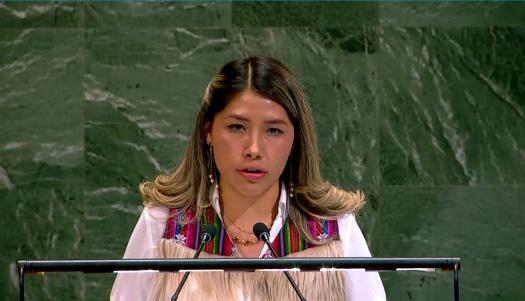
Speech by Mr. Dario Mejia Montalvo, President of the Permanent Forum on Indigenous Issues
(For the original version in Spanish, click here)
Question: The Permanent Forum on Indigenous Issues is one of three United Nations mechanisms dealing with the rights of Indigenous Peoples, whose mandate is to discuss Indigenous issues related to economic and social development, culture, the environment environment, education, health and human rights. How can the Forum continue to strengthen and promote the links between nature and culture?
Thank you for the invitation and for such an interesting question.
The distinction between culture and nature is the creation of a specific way of understanding the world, developed by western, or mainstream society.
But for most Indigenous Peoples, this distinction between culture and nature does not exist. Mother Earth is the bearer of our basic rights and fundamental values that shape the life of beings, including humans.
For example, the water, mountains, the life cycle of plants, are all part of the essence of our value and knowledge systems. These norms are contained in our Peoples’ languages, in the structures of our families and in the institutions of our governments.
They are beliefs that pass from generation to generation. This is what scholars may call “culture”. But for us, as Indigenous Peoples, nature sets the rules of life. And it is this Indigenous worldview that has made it possible for us to conserve at least 80% of the remaining biodiversity on the planet, in Indigenous territories.
There is no culture without nature. And nature cannot be preserved without the recognition of cultural diversity.
The UN Permanent Forum on Indigenous Issues, which is the product of Indigenous Peoples’ advocacy, has promoted this integral vision of life since its establishment, and will continue to do so through its reports, international expert meetings, thematic priorities, and through its recommendations addressed to States, UN entities, academia, and NGOs for analysis and implementation.
In its seventh session in 2008, the priority theme of the Forum was “Climate change, biocultural diversity and livelihoods: the stewardship role of Indigenous Peoples and new challenges”.
The 2008 session emphasized the need to recognize harmony and equilibrium with Mother Earth. But no one listened to us.
But when renowned scientists, film and documentary makers repeat the same thing, they are listened to. Al Gore for example, who is a friend of mine, has even been awarded for this original idea. We are glad that they have been heard and progress is being made. But it was always, and still is, the essence of our being.
The Permanent Forum even called for the need to consider a different vision of the relationship with nature, and proposed the recognition of International Mother Earth Day. Fortunately this was adopted by the UN General Assembly and today is celebrated annually on 22 April. But sadly the interactive dialogue has shifted focus, and now, when they talk about harmony with nature, they don’t even invite Indigenous Peoples anymore.
I would like to reiterate that the members of the Permanent Forum have contributed diligently to this integral vision with our thematic reports, and we will continue to contribute.
For example, our request to this COP is that Indigenous Peoples be recognized for their ability to conserve biodiversity in Indigenous territories, which consequently should be designated a different category from protected areas and other area-based conservation measures. We hope that States will observe this crucial recommendation, particularly since it was transmitted to States through ECOSOC in July of this year.
In 2023, our special theme will be “Indigenous Peoples, human health, planetary and territorial health and climate change: a rights-based approach”. We will meet at the UN headquarters in New York from April 17 to 28. We invite Indigenous Peoples, States, UN entities and other allies to join us in this debate.
It is important that Member States, UN entities and other partners come and hear from Indigenous Peoples, their deliberations and contributions.
Thank you very much.
 Welcome to the United Nations
Welcome to the United Nations


